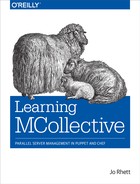Chapter 12. Challenges of Worldwide Parallelism
MCollective provides an amazing toolset for orchestration in small labs all the way up to global enterprises around the world. I’m familiar with a company that manages more than 200 global sites. I’ve assisted a company managing more than 6,000 servers in a central site, with hundreds more at remote data centers. MCollective’s ability to function in both environments is phenomenal.
MCollective will likely work in any small environment right out of the box. To make MCollective work in either of the large-scale environments mentioned above required extensive tuning of the server and broker configurations. Much like a database server, file server, or any other major infrastructure service you’ll need to tune it to operate at scale.
Let’s review some of the issues you’ll need to tune:
- Choose an encryption level suitable to protect your middleware as shown in Anonymous TLS Security and Trusted TLS Servers.
-
Choose a
security pluginthat meets your needs for authentication and authorization as discussed in How Authentication Works. - Define authorization controls to restrict access to specific servers and agents as shown in Authorization and Chapter 10.
-
Set up a
Network of BrokersorMaster-Slaveredundancy to service multiple sites or high-availability needs, as shown in ActiveMQ Clusters. - Tune the middleware brokers and servers for wide area networking, or density of scale as shown in Large-Scale Broker Configurations and Chapter 10.
And finally, you’ll find yourself building your own custom plugins from Chapter 13, Chapter 14, and Chapter 15 to take advantage of the global infrastructure you’ve built.
A year from now, you’ll wonder how you ever got along without MCollective.
